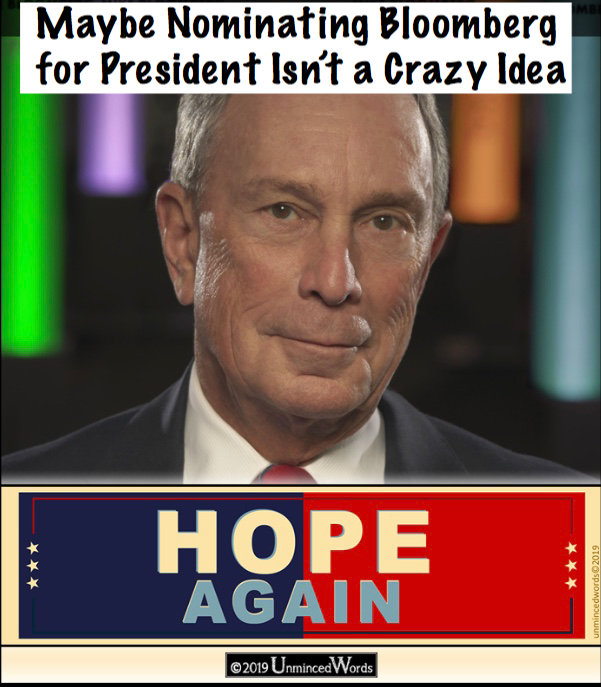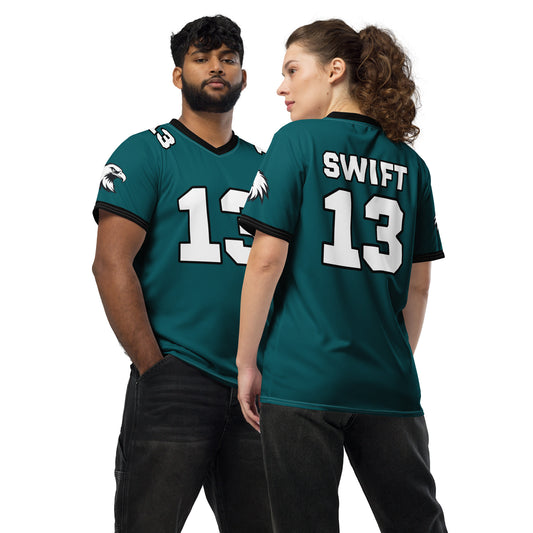
Maybe Nominating Bloomberg for President Isn’t a Crazy Idea
Not long ago, my teenaged kids and one of their friends asked me what I thought about Michael Bloomberg’s presidential campaign. The question momentarily took me aback, since even though I spend hours a day following campaign coverage, so little of that coverage is devoted to Bloomberg, who has barely campaigned yet, I almost forgot he declared his candidacy a couple months ago. But ads for Bloomberg’s campaign — unlike ads for nearly all the other candidates I do read about — have found their way onto whatever screens my kids look at. That is not surprising, since Bloomberg is spending far more than all the other Democratic candidates combined. He is creeping up in the national polls, having crossed the 5 percent mark.
I am not endorsing Bloomberg for president. In point of fact, I’ve changed my mind on who I plan to vote for several times and may change it again. But the notion that once struck me as totally ridiculous, and is still not taken seriously by many political journalists or party officials, may not be crazy. Against Bloomberg’s liabilities — and there are many, which I will discuss below — his candidacy would bring some enormous advantages.
1. Money. Back to School is a 1987 comedy in which Rodney Dangerfield plays a déclassé millionaire who buys his way into college. A professor objects to admitting a rich guy simply because he donated to the school, to which the dean replies, “I don’t think Dr. Barbay understands the actual amounts that are involved here.”
You surely realize that Bloomberg is a very wealthy individual with the ability to self-fund, but you may not have focused on the actual amount of money Bloomberg could bring to bear on the campaign. It is beyond any experience in presidential history. In the last presidential election, Donald Trump spent $343 million. Spending by both sides, including outside money, barely exceeded $1 billion. Bloomberg is personally worth $56 billion. If nominated, he could easily part with one-tenth of his fortune and outspend the entire Republican party by five to one.
The evidence of the effect of political spending is mixed. Studies have reached contradictory conclusions on the marginal benefits of voter-registration drives, turnout operations, and paid advertising. But it seems fair to guess that potential outspending your opponent by five or ten to one on all these things is probably worth a couple points in the polls.
2. Climate. Bloomberg’s commitment to the progressive agenda may be, on the whole, shallower and narrower than other candidates’. But climate change is an issue on which the sincerity of his commitment cannot be seriously questioned. He has poured energy and hundreds of millions of dollars into the cause, giving it a singular priority no other candidate (except the departed Jay Inslee) can match.
It may well be true that Bloomberg would give lower prioritization to issues that the Democrats would emphasize — like social welfare spending or regulation of finance and other industries — but he will not give climate change short shrift. And climate change is a very good issue, perhaps the best issue, to emphasize. The next Democratic president after Bloomberg can always come along and crack down on Wall Street, but the timing of the climate emergency presents no such luxury. The losses caused by climate change are irreversible. And since climate change is probably never going to be an urgent first-order concern for voters, having a president with a sincere commitment to the issue over populist reforms with more short-term popularity actually matters a lot.
3. Competence. Bloomberg ran a city with a population that exceeds that of 38 states. It has more than twice as many people as Arkansas, the governorship of which was considered a perfectly satisfactory résumé for Bill Clinton. And while his stewardship was not always agreeable, it was generally quite efficient.
The same holds true of his environmental activism. Michael Grunwald reported on Bloomberg’s “Beyond Coal” activism, which helped force 300 coal plants to close, and which has caused the dirtiest power source to continue shrinking despite Trump’s efforts to revive it. (Bloomberg has since broadened his objective to “Beyond Carbon,” taking on the harder task of replacing natural gas with zero-emission fuel.) Bloomberg obviously had the advantage of enormous resources to support this project, but the fossil-fuel lobby is hardly poor. In any case, lots of wealthy people have spent lavish sums on political projects to no avail. Bloomberg has quite a lot to show for his money.
What about the downsides? There are plenty of them. In general, Bloomberg’s ideological orientation is an awkward fit for the Electoral College. He leans left on social issues and right on economics, while the states with the greatest chance to swing the election — Michigan, Pennsylvania, and Wisconsin — have disproportionate numbers of working-class voters whose instincts run in the opposite direction. The kind of populist language to which Trump is vulnerable does not come naturally to Bloomberg.
If elected, Democrats would have good cause to distrust his instincts. Bloomberg is close to Wall Street, which he ludicrously absolved of blame for the financial crisis, and is generally over-trusting of the rich. Only after announcing his candidacy did he offer belated and a patently insincere apology for the stop-and-frisk policy that justifiably angered so many of his nonwhite constituents.
But some of these concerns would be resolved simply by dint of Bloomberg running as a Democrat. This is an era of party government, and while the president’s talents and beliefs matter, the personal idiosyncrasies of any one officeholder are usually swallowed up by his political coalition. This is why Donald Trump defied the distrust of his fellow conservatives and has governed in an ideologically — if not personally — conventional style. Bloomberg’s platform has largely converged with the Democratic mainstream.
Whether his commitments to party constituencies are sincere hardly matters, because his incentive to hold together his coalition is the binding force. Trump used to identify as a proudly pro-choice Democrat, and then as an independent. No reversal was more laughably insincere than Trump’s conversion to the pro-life cause, yet he has held to that stance because it is in his interest as a Republican to do so.
Bloomberg would be a seriously flawed candidate. But the campaign seems to be exposing all the candidates as seriously flawed, while frequently generating new flaws as they and their supporters tear each other to shreds. Whoever survives the primary, which still has months to go, will face a well-funded incumbent president benefitting from a mature economic expansion he inherited. Winning the presidential election is starting to look hard. How about buying it instead?
By Jonathan Chait
Original article at: http://nymag.com/intelligencer/2020/01/michael-bloomberg-president-democrats-beat-trump.html
At Unminced.com we like calm, thoughtful Presidents. #mikebloomberg #bloomberg #bloombergforpresident #america #election #friend #resist



















